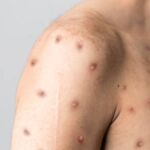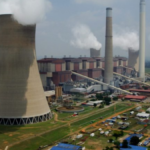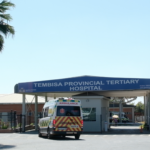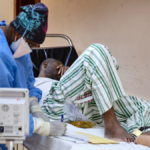| Universal access to healthcare | Climate change | Food security |
| Social grants | Basic income grant | Tuberculosis |
| HIV | Corruption | Gender-based violence |
Here’s what ActionSA says about health issues.
Universal access to healthcare
ActionSA opposes the National Health Insurance (NHI) Bill (which was signed into law on 15 May), saying it’s not aligned with what the country’s public healthcare system can manage. Implementing it, they say, may make healthcare worse. Instead, the party will focus on fixing public health services by tackling corruption, improving management and investing more in primary healthcare.
Universal health coverage, which gives everyone access to the same basic health services, regardless of whether they can pay for it, is a 2030 sustainable development goal. At the moment, South Africa has a two-tier (public and private) health system. The NHI is the current government’s plan for rolling out universal healthcare.
ActionSA says the private healthcare sector has the power to ease the burden of providing healthcare, but it must be more accessible. For that they say they’ll work towards there being more affordable comprehensive medical insurance options, expand minimum benefits and improve oversight over the profit-driven aspects of healthcare, like price gouging. They’ll also ensure more support for people with disabilities by giving them easier access to specialised services.
On health facilities, the party says the following:
- ActionSA wants to build more public hospitals and clinics, and train and hire more medical professionals to bridge the gap between public and private healthcare quality.
- They promise to protect healthcare facilities from power outages to ensure uninterrupted services, make the facilities safe for staff and patients, and make healthcare more accessible for people with disabilities, for example by hiring or training staff proficient in sign language.
- They will review and fix working conditions in public health facilities, and promise to put quality assurance standards in place that focus on dignified patient care.
On health workers, the party says the following:
They will appoint more doctors and specialists in public health and review the country’s critical skills list, and simplify work visa processes to make immigration for skilled workers easier.
South Africa has eight doctors for every 10 000 people, according to 2021 data from the World Health Organisation. This is about half the global average. However, because of budget constraints, more doctors are being trained than who can be hired. Doctors who do have jobs in the state sector aren’t paid enough, though, said the South African Medical Association last year.
The party also promises to spend more on frontline services by reducing expenses on healthcare administration.
The party says the following about health services:
- They promise to fix substance abuse by treating it as a healthcare issue, while targeting drug traffickers. They will give rehab support to users, while breaking up drug syndicates through tough policing and tight border control. They will impose harsher penalties for drug-related crimes and have a special law enforcement unit to combat the drug trade.
- They promise to protect vulnerable citizens by giving them access to quality healthcare and social support services, starting from early childhood development.
- They will eradicate pit toilets and mud schools, invest in broadband internet access for all learners and make sure that all schools have running water and electricity.
- Free sanitary products will be distributed at schools, clinics and hospitals.
Click here to go to the elections manifesto analysis tool.
Climate change
ActionSA supports the science behind climate change and its consequences (the manifesto mentions that global warming leads to frequent weather disasters), but it doesn’t refer to the targets South Africa agreed to for achieving net zero carbon emissions by 2050.
Net zero refers to the amount of greenhouse gases we emit (mostly from burning coal, oil and gas in producing electricity or fuelling vehicles) balancing with the amount the Earth’s ecosystems are able to absorb naturally so that there’s no build-up of these gases in the atmosphere where they form a layer that traps heat and so results in the air heating up.
ActionSA promises a gradual move to renewable energy sources to lower the carbon emissions from the country’s energy system. They want to set up smaller grids, especially in rural areas, so that people won’t have to rely on only one electricity provider as the country does now. They will invest in providing poor households with rooftop solar panels and solar-powered geysers and support local green industries to increase the profits gained from exports.
The party says they’ll make sure moving to renewable energy sources will be a just transition, which means that people working in fossil fuel industries now won’t lose their jobs unfairly. They will do this by helping communities to be part of the planning and implementation process, help workers to reskill and work with other countries to help South Africa build the necessary skills to maintain the electricity grid.
To deal with the fallout of (climate-related) natural disasters, the party promises:
- housing that can withstand the effects of these events
- training government officials to deal with climate-related events
- coordination between the government, private sector, civil society and academic institutions to help respond to climate change and natural disasters.
Click here to go to the elections manifesto analysis tool.
Food security
To ensure water and food security, an ActionSA government will build partnerships with food producers, retailers and food banks to help people access healthy food and increase the country’s water supply to households.
ActionSA will fund feeding schemes at early childhood development centres (like nurseries and creches) to ensure that young children get enough healthy food.
Click here to go to the elections manifesto analysis tool.
Social grants
ActionSA wants to make people less reliant on social grants by fixing the economy. In the meantime, they plan to increase existing social grants and introduce a cash payment they call a universal basic income stimulus “to protect the most vulnerable in society from the effects of poverty” (also see the next section). About 28-million people — about half the country’s population — currently get a social grant.
The party says they’ll eliminate corruption and inefficiencies when it comes to paying out social grants. They promise to introduce technological solutions like mobile payments for easier access to funds and review the grants system regularly so that payouts won’t be interrupted or delayed.
Click here to go to the elections manifesto analysis tool.
Basic income grant
If voted into power, ActionSA plans to introduce a universal basic income stimulus to ease poverty and help vulnerable citizens participate in the economy. This cash payment will be available to all adult South Africans and permanent residents who register as recipients.
The party will start the process for the legislation of this stimulus in 2025, with the new administration’s first budget. It will be subject to feasible financing mechanisms.
Cash transfers, for a period of three years, will be R790 per month in the first year, R1 101 a month in the second year and R1 622 a month in the third year, and will be linked to poverty bands, aligned with the most recent poverty lines. (The first year’s payment is based on the food poverty line [currently at R760], adjusted for inflation, with the next two years’ payments based on the lower and upper bounds of the poverty line.) The party further promises to adjust these payments over time to take inflation and changes to the national poverty standard into account.
These payments are designed to boost economic growth by at least two percentage points, leading to 1.6-million new jobs, the party says.
Click here to go to the elections manifesto analysis tool.
Tuberculosis
The ActionSA manifesto doesn’t mention tuberculosis specifically. TB kills more people than any other illness in South Africa.
Click here to go to the elections manifesto analysis tool.
HIV
The ActionSA manifesto doesn’t mention HIV. About 7.8-million South Africans are living with HIV, of whom about 75% are on antiretroviral treatment.
Click here to go to the elections manifesto analysis tool.
Corruption
If voted into power, ActionSA says its first step in fixing the public healthcare system will be to eliminate corruption (which they say also spans abuses of power and negligence), streamline management and invest more in primary healthcare facilities.
They plan to change procurement rules to reduce corruption and attract more investment into public projects (such as by changing bureaucratic stipulations in laws, which block investment or buying efficiencies, and making abuse of power by people in high positions a criminal offence), train officials to spot corruption and protect whistleblowers.
ActionSA plans to advocate for a constitutional amendment so that a Chapter 9 anti-corruption institution can be set up with well-trained staff whose appointments are safeguarded by the law and enough funds (which will be a fixed percentage from the annual national budget) to combat, investigate and prosecute corruption without bias. (Chapter 9 institutions are independent and impartial bodies to keep our democracy safe, eg the SA Human Rights Commission and the Public Protector.)
They will set aside a fixed budget to fight corruption each year.
They have other plans too, like strengthening law and order, creating jobs, improving the distribution of social grants, and teaching children ethics in schools to fight crime and corruption in the future.
Click here to go to the elections manifesto analysis tool.
Gender-based violence
ActionSA promises to set up special centres to provide medical, legal and psychological support to victims of gender-based violence (GBV). They will let police officers undergo sensitivity training to help build trust between victims and the police.
ActionSA promises:
- stricter penalties for violent crimes against women, children and vulnerable people
- longer jail time for murder, rape and aggravated assault
- removing the possibility of parole for people found guilty of multiple rape and murder charges.
Crime statistics for the 2022/23 financial year show that sexual assault and rape make up more than 90% of all reported sexual offences. Over the past 10 years, numbers have not come down much, with the total number of reported cases hovering around 52 000 per year. Almost 43 000 rapes were reported in the past year, similar to the numbers over the last decade.
Click here to go to the elections manifesto analysis tool.
Read the full, original manifesto here.




